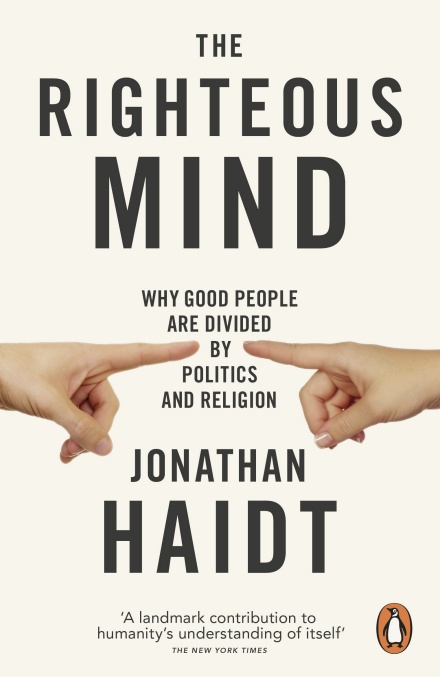Dan Keck reviewed The Righteous Mind by Jonathan Haidt
Review of 'The Righteous Mind' on 'Goodreads'
5 stars
This is such a worthwhile read. The author explores morality through psychology, and draws on a lot of personal experience and scientific experiments to back up his claims.
Here were the most intriguing ideas:
Most people believe themselves to be rational - that they use reason to make decisions. But the author says this is false. Through their intuition, people make judgments and decisions in an instant. Reason then is just a tool used to defend their original judgments. Have you ever seen people on Facebook continue to argue a point in the face of all logic against it? Or, when no more arguments can be thought up, just stop talking and disappear? (Or, in the worst case, go back and delete their conversation?) I know I've seen it before … and been guilty of it myself. It's because people will fight hard to protect the original judgment their brain devised. The author demonstrates it in action in a set of fun scientific experiments.
Therefore, to expect a perfect society ruled by emotionless Spocks or philosopher kings is a joke, because people don't function that way.
The author identifies six types of morality and describes how liberals and conservatives emphasize different types. As a result, you can have two people who are both good people but have fundamental disagreements about morality and are even baffled by each others' feelings. I'm sure you've seen this in action, when you see a crowd cheer during a speech by a politician not from your preferred political party.
The author identifies himself as liberal. However, a main theme of his book is being open minded and trying to understand people who think differently. As such, he kind of treats conservatives with kid gloves, but he includes some fascinating criticisms of liberals.
The most helpful discussion for me was that of disgust. He describes the emotion as originally used by humans to prevent them from eating the wrong thing or touching something diseased and becoming sick. But disgust has adapted to help enforce people's senses of morality. In the past I have seen people say they are disgusted by some political issue on Facebook, and it baffled me. Why is this person literally feeling sick about something that seems completely harmless to me? I always assumed that they were exaggerating and not choosing their words carefully. But now I understand that they truly were physically disgusted by something that violated the basis of their morality, and that I should take this very real reaction into account.
Anyway, great book. The author's style is pleasant and patient, and he still packs in a lot of insights, backed up by data. I recommend it.

